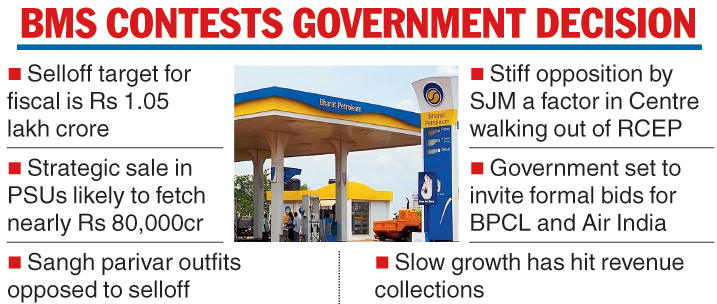The Swadeshi lobby is hotly contesting the Narendra Modi-government’s move to sell majority stakes in BPCL and some other PSUs, with RSS trade union Bharatiya Mazdoor Sangh (BMS) questioning the merits of the selloffs, which are critical to meet the government’s revenue target.
“Previously, the government wanted to sell loss-making units, but found that no sensible parties are ready to buy them. So, now the new policy is to sell hot-selling profit making PSUs,” Virjesh Upadhyay, general secretary, BMS, said. “It is not good economics. Hence, government has to rethink seriously about its revenue crisis.”
This is not the first time that bodies affiliated to the Rashtriya Swayamsevak Sangh (RSS), the ideological parent of the ruling BJP, have raised concerns over the economic policies of the Modi government.
The Swadeshi Jagran March (SJM) had termed the government’s strategic disinvestment programme an “imprudent business decision” that goes against the country’s national interest.
The SJM had lobbied intensely against the RCEP deal.
“The government has spent on many useful welfare schemes and also mindless concessions especially to the big corporates… treasury has got depleted,” Upadhaya said.
“Hence, the government is in search of funds. The easiest way is to sell PSUs, which are the national wealth created by our predecessors,” he said.

The Telegraph
The BMS would hold a one-day protest on January 3 to save the PSUs.
The union also plans to prepare a memorandum for finance minister Nirmala Sitharaman.
The SJM had earlier vociferously opposed India’s move to join the RCEP, a mega free trade deal that was proposed between the 10 Asean members and their six leading trade partners — India, China, Australia, New Zealand, Japan and South Korea.
SJM national co-convener Ashwani Mahajan had said if the RCEP deal was allowed, China, which is already dismantling Indian industries, would end up killing them. The pressure mounted by the SJM forced the government to formally opt out of the RCEP.
The voice of dissent within the Sangh Parivar comes at a time the government is considering to issue expressions of interest (EoIs) for BPCL and Air India next month.
In November, the government had kicked off a mega disinvestment plan with the sale of five public sector units (PSUs), including majority stakes in blue-chip oil companies Bharat Petroleum Corp Ltd (BPCL) and the Shipping Corporation of India.
Also on sale will be a 31 per cent stake in Container Corporation of India (Concor). The winning bidder will also get management control of the companies.
Based on market prices, the sale of stakes will fetch the government about Rs 78,400 crore, taking it close to its disinvestment target of Rs 1.05 lakh crore for the fiscal year.
At current market value, the government can raise about
Rs 63,000 crore from selling its entire 53.3 per cent stake in BPCL.
The actual realisation could be much higher on account of the control premium the government will seek from any strategic investor.
Big international oil companies, including Saudi Aramco, are reportedly keen on BPCL, given the PSU refiner’s strong presence in fuel retail.
Sitharaman at an industry event last week had asked the industry to bid for the PSUs. “Disinvestment of PSUs is happening and some of you may have to come forward to participate in them and offer a bid. You can’t remain quiet.
“You look at prospects of growing your businesses by picking up some of these companies which are being offered. These are essentially good companies and you must be the first bidders,” she said.
The government has hiked its disinvestment target to Rs 1.05 lakh crore this fiscal from Rs 90,000 crore a year ago.
The higher target comes amid the slow growth in tax proceeds, forcing the government to focus on non-tax revenue sources.
Data showed fiscal deficit in the first seven months through October stood at Rs 7.2 lakh crore, or 102.4 per cent of the budgeted target, for the current fiscal year.











